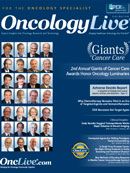CLL Researcher Excited About Outlook for CDK Inhibitors
Joseph Flynn, DO, MPH, focuses on the development of novel therapeutics for the treatment of chronic lymphocytic leukemia (CLL) and non-Hodgkin lymphoma (NHL) in his research at The Ohio State University Comprehensive Cancer Center.
Joseph Flynn, DO, MPH
Joseph Flynn, DO, MPH, focuses on the development of novel therapeutics for the treatment of chronic lymphocytic leukemia (CLL) and non-Hodgkin lymphoma (NHL) in his research at The Ohio State University Comprehensive Cancer Center.
He is a member of the research team that helped develop ibrutinib (Imbruvica) as a treatment for patients with CLL, an accomplishment that the Clinical Research Forum recently recognized. The organization, which is composed of leading American academic institutions, selected the Ohio State University leukemia team for one of its 2014 Top 10 Clinical Research Achievement Awards.
Flynn also serves as co-director of the LIVESTRONG Survivorship Center of Excellence and as medical director of the James Survivorship Clinics. He discussed several facets of his work with cyclin-dependent kinase (CDK) inhibitors in this interview with OncologyLive.
Could you briefly describe your research interests?
We have been actively involved in the study of CDK inhibitors in the treatment of relapsed and refractory CLL. For instance, we have studied the use of flavopiridol (alvocidib), dinaciclib, and more recently TG02, which is an oral inhibitor of various kinases, including CDKs, in CLL.
Why do cyclin D-dependent kinases make such attractive targets for cancer therapy?
Since these CDKs are involved in cell cycle regulation pathways, targeting these can result in the death of tumor cells with the potential for decreased toxicity.
How close are we to regulatory approval of a CDK inhibitor and, in your opinion, which of the agents currently in clinical development is most promising?
It is difficult to predict the pathway for these inhibitors. Many things impact on whether an agent will be brought to market, including disease target, toxicities, and the company’s internal goals.
In your opinion, what is the most exciting recent finding relating to the role of CDKs in cancer?
I feel that the experience of the CDK inhibitors in CLL offer the most encouraging results. Specifically, the activity of dinaciclib in relapsed and refractory, high-risk CLL has been very exciting.
What are the most significant challenges that remain to the effective targeting of CDK for cancer therapy?
Determining the most apropos population to treat with these agents and administering in a manner that mitigates toxicities such as acute tumor lysis syndrome will be very important moving forward. As more and more targeted therapies become available, preclinical and early clinical identification of tumor types will be very important.




